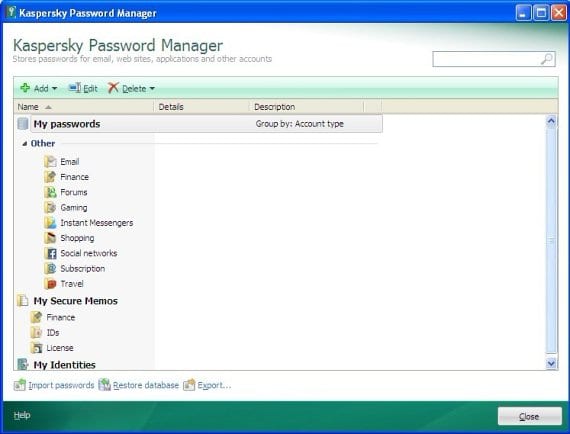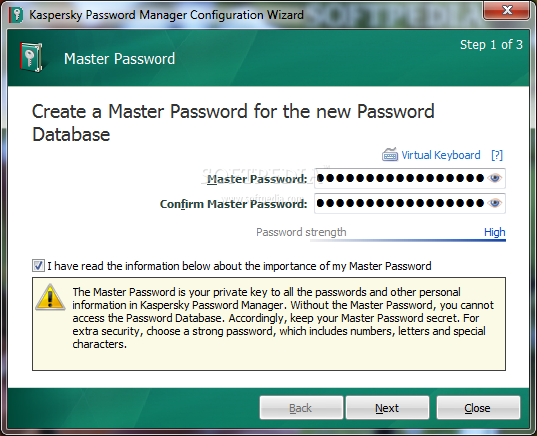

- #Kaspersky password manager flaw bruteforced passwords how to#
- #Kaspersky password manager flaw bruteforced passwords pdf#
- #Kaspersky password manager flaw bruteforced passwords generator#
- #Kaspersky password manager flaw bruteforced passwords full#
They will fail to open with an incorrect password message. older than V1.5.16 on macOS and V1.6.29 on iOS). Note that safes with enhanced encryption won’t be recognised by

V2: adds password history, autofill customisation.The safe version will be indicated on the password history panel: The safe password needs to be updated for enhanced encryption to be enabled. a safe specific salt is added (further complicating decryption).Įnhanced encryption is a new option in SamuraiSafe settings.PBKDF2 runs 50 times more iterations 1,.can use a stronger algorithm to generate the encryption key:.ensures your safe password is strong (by setting a minimum standard for safe passwords),.Samurai Search (iOS)Īs hardware has become faster, the cost of a brute-force attack on an encrypted safe has fallen. You may then open selected files in your favourite editing/viewing app.
#Kaspersky password manager flaw bruteforced passwords pdf#
Samurai Search searches source code, plain text and PDF files on your iOS device or in iCloud. Supports Touch/Face ID and Password Autofill.
#Kaspersky password manager flaw bruteforced passwords generator#
The password generator included in Kaspersky Password Manager had several problems.SamuraiSafe is a password manager for iOS and macOS. The most critical one is that it used a PRNG not suited for cryptographic purposes. Its single source of entropy was the current time. All the passwords it created could be bruteforced in seconds.
#Kaspersky password manager flaw bruteforced passwords how to#
This article explains how to securely generate passwords, why Kaspersky Password Manager failed, and how to exploit this flaw. It also provides a proof of concept to test if your version is vulnerable. The product has been updated and its newest versions aren’t affected by this issue.

Stupid programming mistake, or intentional backdoor? We don’t know. More generally: generating random numbers is hard. I also recommend my own password manager: Password Safe.ĮDITED TO ADD: Commentary from Matthew Green. Tags: Password Safe, passwords, random numbers, vulnerabilitiesĪpplying Hanlon’s razor (“never attribute to malice that which is adequately explained by stupidity”), I would rule out a backdoor, as identical passwords would be generated for different users.Ī properly implemented backdoor wouldn’t be as obvious and weak as this one.

I would have added a few bits of “entropy” to the seed (which would only have to be guessed once for a given user), increasing the search space, while still making an informed brute-force approach entirely manageable.Īll major OSes provide (semi-)decent RNGs (*nix: /dev/random Win: CryptGenRandom, Android: SecureRandom, etc., etc.), which even though they require some leap of faith in trusting their suppliers, are certainly a far cry from using TOD in seconds as a seed. I recently tried to register for a certain site, and was appalled to discover that some wise-ass programmer managed to disable copy-and-paste and browser-supplied password managers, while still insisting on “complicated” patterns, which must therefore be entered by hand. (lower and upper case, number, special character, a rune, and two symbols from the Cabal). I must occasionally patch-up my PW generating script for the silliness du jour… Of course, not all sites have identical password requirements, and a password generated for one may not work for the other. See the fatal assumption with the last one using MD5? Now look and see how many of the examples use “Date”? It’s only a little over a year and a half old so you would think should be fairly uptodate security wise, and know about “known security faults” going back to the late 1970’s if not further right?… Just hours apart, I find out about similar defects in two different passcode generators.
#Kaspersky password manager flaw bruteforced passwords full#
The internet is full of such “pearls of wisdom”, and if you do not know any better, which obviously many don’t… You end up with “Blaim the Intern Syndrome”, where what someone who should know better but obviously does not gives what they think is a simple task to the “summer intern”. Nobody then actually checks and several years later…Ĭall it a failure of the “creative commons” or “Cut-n-Paste coding”… The intern not having a clue looks up the problem on the Internet and “Cuts-n-Pastes” some example from someone who is equally as cluless.


 0 kommentar(er)
0 kommentar(er)
